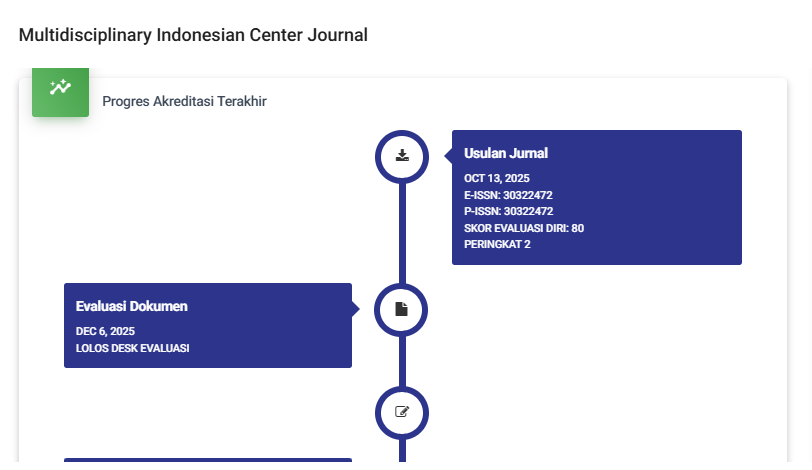NURSING CARE FOR SENSORY PERCEPTION DISORDERS: AUDITORY HALLUCINATIONS IN Mr. T WITH A FOCUS ON HARASSMENT TECHNIQUES AT THE DR. RM. SOEDJARWADI REGIONAL MENTAL HOSPITAL, KLATEN
DOI:
https://doi.org/10.62567/micjo.v2i4.1458Keywords:
Nursing care, auditory hallucinations, reprimand techniqueAbstract
Mental disorders are a health problem that remains a major challenge in Indonesia. Auditory hallucinations are a sensory perception disorder that often occurs in patients with schizophrenia. Patients have difficulty distinguishing between real and unreal stimuli, which can lead to risky behaviors such as harming themselves or others. One non-pharmacological intervention that can be applied to address hallucinations is the rebuke technique, which is a firm and directed verbal action to reject perceived hallucinations. The purpose of this study is to describe nursing care for patients with sensory perception disorders: auditory hallucinations with the application of the rebuke technique as the main intervention. This study uses a descriptive case study approach on one patient in the Flamboyan Ward of Dr. RM. Soedjarwadi Klaten Mental Hospital. Data collection was carried out through interviews, observations, and documentation studies, then analyzed based on the stages of the nursing process. The results showed that after the rebuke technique intervention was consistently implemented for three days, there was a decrease in the frequency of hallucinations from 3-4 times to 1-2 times a day. The patient also showed an increase in the ability to recognize and reject hallucinations independently. Furthermore, the patient began to engage in social interactions and participate more actively in daily activities. The conclusion is that the reprimand technique has proven effective as a nursing intervention in addressing auditory hallucinations. This intervention is simple, easy to implement, and can improve the patient's coping skills in dealing with hallucinatory symptoms.
Downloads
References
Agustina, N. (2017). Measuring the Quality of Academic Information System Services at Uswatun Hasanah Middle School, Jakarta. Paradigma , 19 (1), 61–68. https://ejournal.bsi.ac.id/ejurnal/index.php/paradigma/article/download/1540/1310
Aliffatunisa, F., & Apriliyani, I. (2022). Implementation Strategy for Recognizing and Reprimanding Hallucinations in Schizophrenia Patients with Auditory Hallucinations. JKM: Independent Nursing Journal , 2 (2), 164–168. https://doi.org/10.36086/jkm.v2i2.1258
Cahyani, A., Putri, KA, Diani, RAP, & Melati, PS (2022). Application of Nursing Ethics in Home Care Practice Services. Journal of Complementary Health , 2 (1), 67–72. https://doi.org/10.36086/jch.v2i1.1495
Dewi, LK, & Pratiwi, YS (2022). Application of Reprimand Therapy for Sensory Perception Disorders and Auditory Hallucinations. Proceedings of the National Health Seminar , 1 , 2332–2339. https://doi.org/10.48144/prosiding.v1i.1068
Hapsari, DF, & Azhari, NK (2020). Application of Reprimand Therapy to Decrease Auditory Hallucination Scores in Schizophrenia Patients at Dr. Amino Gondohutomo Mental Hospital, Central Java Province. Sisthana Nursing Journal , 5 (1), 30–34. https://jurnal.stikeskesdam4dip.ac.id/index.php/SISTHANA/article/view/64
Hasanah, N., Rahmawati, A., & Aji Pamungkas, B. (2024). The Relationship Between Medication Compliance and Relapse in Schizophrenia Patients in the Kutilang Ward, Lampung Provincial Mental Hospital. Scientific Journal of Health , 13 (1), 2024. https://ejournal.umpri.ac.id/index.php/JIK%7C97
Iba, DZ, & Wardhana, A. (2023). Research Data Collection Techniques. In Nursing Journal (Issue July).
Kota, NK, & Avelina, Y. (2022). Implementation of Reprimand Interventions in an Effort to Reduce Auditory Hallucinations in Schizophrenia Patients. Jurnal Kesehatan Saintika Meditory , 7 (1), 236–241. https://jurnal.syedzasaintika.ac.id/index.php/meditory/article/view/2535
Larasati, ND, & Widodo, A. (2023). Assessment of Mental Health Nursing Care with Sensory Perception Disorders: Auditory Hallucinations in Mrs. E in the Larasati Ward, Surakarta Regional Mental Hospital. Scientific Journal of History Education Students , 8(3 ) ( 3), 2100–2109. https://doi.org/10.24815/jimps.v8i3.25471
Linda Puspitasari, & Puji Astuti, A. (2024). Management of Sensory Perception Disorders: Auditory Hallucinations in the Condemning Phase through the Application of Hallucination Management Strategies. Journal of Healthy Cultured Nursing , 2 (1), 15–19. https://doi.org/10.35473/jkbs.v2i1.2468
Maharani, D., F, NL, & H, U. (2022). Application of Classical Music Therapy to Signs and Symptoms in Patients with Auditory Hallucinations. Jurnal Cendikia Muda , 2 (1), 24–31. http://www.jurnal.akperdharmawacana.ac.id/index.php/JWC/article/view/288
Maulia, E., Novitayani, S., & R, FD (2022). Acceptance and Commitment Therapy in Patients with Auditory Hallucinations: A Case Study . 1 , 125–131. https://jim.usk.ac.id/FKep/article/view/21444
Nabila, A., Marthoenis, & Aiyub. (2024). Nursing Care for Patients with Auditory Hallucinations: A Case Study. VIII , 130–137. https://jim.usk.ac.id/FKep/article/view/26162
Prastiwi, AH, & Apriliyani, I. (2020). The Effectiveness of the Distraction Technique in Schizophrenia Patients with Sensory Perception Disorders: Auditory Hallucinations. British Medical Journal , 2 (5474), 1333–1336. https://jurnal.globalhealthsciencegroup.com/index.php/JPPP/article/view/6534
Pratiwi, M., & Setiawan, H. (2021). Scolding Actions to Overcome Auditory Hallucinations in Schizophrenic Clients in a Mental Hospital. Jurnal Kesehatan , 7 (1), 7. https://doi.org/10.46815/jkanwvol8.v7i1.76
Putra, W., & Jalu, UC (2022). Nursing Care for Hallucinatory Patients with Dangdut Music Therapy at Madani Regional General Hospital, Central Sulawesi Province. Collaborative Journal of Science , 5 (6), 365–373. https://doi.org/10.56338/jks.v5i6.2519
Putri, AR, Trisnawati, C., & Puspasari, FD (2022). Nursing Care for Patients with Sensory Perception Disorders: Auditory Hallucinations . 33 (1), 1–12. http://jurnal.politeknikyakpermas.ac.id/index.php/jnh/article/view/178
Rahim, AA, Yulianti, S., & Maryam. (2024). Implementation of the Reprimand Technique to Control Auditory Hallucinations in Schizophrenia Patients at Madani Regional Hospital, Central Sulawesi Province . 7 (11), 4274–4280. https://doi.org/10.56338/jks.v7i11.6644
Reliani, & Rustarafaningsih. (2020). Phenomenological Study of Precipitating Factors of Auditory Hallucinations in Schizophrenia Patients at Menur Mental Hospital, East Java Province. Muhammadiyah University of Surabaya , 0711028104 . http://repository.um-surabaya.ac.id/5923/%0Ahttp://repository.umsurabaya.ac.id/5923/1/3_Laporan_Penelitian_Bu_Reliani_-_Done.pdf
Retni, A., Harismayanti, Sudirman, AN, & Daud, AW (2023). The Effectiveness of Group Therapy for Socially Isolated Patients in the Limboto Community Health Center Work Area, Gorontalo Regency. Cereals For , 8 (1), 51. https://journal.um-surabaya.ac.id/JKM/article/view/23205/8372
Rizal, R., Shandy, VR, Rusdi, MS, & Afriye ni, H. (2022). Journal of Research Results and Scientific Studies of the Exact Sciences. Jppie , 01 (01), 59–64. http://jurnal.unidha.ac.id/index.php/jppie
Rizkiana, N., & Rahmawati, AN (2024). Case Study of the Application of Reprimanding Exercises to Hallucinatory Patients. Journal of Language and Health , 5 (2), 699–706. https://jurnal.globalhealthsciencegroup.com/index.php/JLH/article/view/3646
Downloads
Published
How to Cite
Issue
Section
License
Copyright (c) 2025 Choeriyatun Ngatiyah, Sudiarto, Wiwik Priyatin

This work is licensed under a Creative Commons Attribution-ShareAlike 4.0 International License.



























